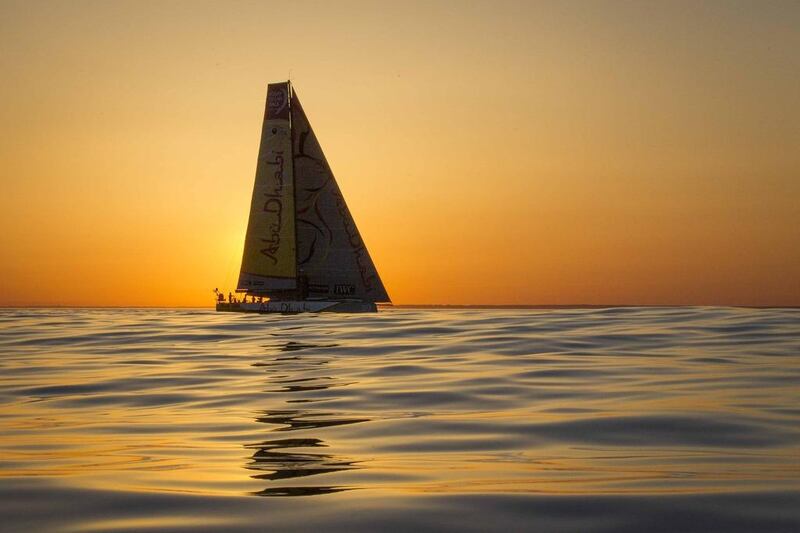Seven years ago this month, a delegation from the Abu Dhabi Tourism and Culture Authority (TCA) travelled to Stockholm to meet Knut Frostad, then the chief executive of the Volvo Ocean Race.
That year’s race was coming to an end, but TCA’s plans were just starting. They wanted a platform from which to build on an already deep maritime heritage and further tourism figures in the emirate.
The delegation met with race officials and several teams, including one led by Ian Walker and Jamie Boag. A year later, TCA had put together a team – Abu Dhabi Ocean Racing (Ador), led by Walker and Boag – as well as a bid for a stopover.
Almost exactly six years after that first trip, now a year ago, there came a remarkable culmination. Azzam, Ador's boat, won the VOR, the toughest ocean sailing race in the world bar none.
Mostly it was remarkable because it was only the second time Azzam had taken part and the first race, in 2011-12, had been a small-scale disaster. But it was also because of how tough the race was this time: one-design boats meant the field was level and the racing closer than ever before.
See also:
• Ali Khaled: Emirati sailing champion Adil Khalid intent on flying the UAE flag at Olympics once again
• Osman Samiuddin: Hard part for Abu Dhabi was winning Volvo Ocean Race – hardest part will be building on it
• Osman Samiuddin: Volvo Ocean Race won, Abu Dhabi now celebrate – and assess future of Azzam project
Azzam were ruthless, finishing on the podium in almost each of the nine legs, as well as the in-port races. For most of the legs, they had Adil Khalid as a key member, an Emirati Olympian and a quiet, shy hero in the Emirati sailing community. Frostad was not wrong when he said the achievement was one of the "biggest" in the UAE's sporting history.
The final culmination of that journey, however, came this Tuesday. VOR announced on its website that the five-year association with Ador and Abu Dhabi had finally come to an end – Abu Dhabi will not have a team or a stopover in the next edition of the race in 2017-18.
One way to look at it is to acknowledge it as a natural end. The original agreement was as a two-race deal. And with the win last year, it is safe to assume that the main objectives of the project were achieved.
But it is only natural to feel a tinge of sadness at the end of what has turned out to be an immense journey. A single VOR creates such a narrative of human adventure and endeavour, of a battle between man and the elements he was born to, but Azzam's ride, over two races, has been a different scale of epic.
Right from the very first night of the first race, in October 2011, when they broke their mast hours into the start and pulled out of the leg, it was clear that this would be no humdrum participation.
"Of course it wasn't without its ups and downs," Azzam's skipper Ian Walker said in a statement, with some understatement. "None of those involved will fail to remember the gut-wrenching disappointment of the mast breaking on the first night leaving Alicante in 2011, or the desperate bid to stay in the race after damaging the boat in the Southern Ocean and retiring from Leg 5."
The highs were incredible, not least winning the treacherous Auckland-Itajai leg, the leg across the Southern Ocean they had not completed in the first year, but the winning of which second time round eventually set them on their way to triumph. Only the very best survive that leg, let alone win it, and in further setting a 24-hour speed record during the course of it.
There was the in-port race triumph in Abu Dhabi in the first edition, but there was also Khaled’s celebration of the UAE’s National Day out at sea, between Cape Town and Abu Dhabi on the Indian Ocean.
He decided to shed normal sailing kit and instead wore the kandura for a few days (making for a memorable photograph). He did it partly because of the heat but mostly as a nod to the UAE’s sailing heritage, to those predecessors who used to go pearl diving on their dhows for days.
Walker’s sweat and blood was evident through every minute of this journey though.
He looked tired and haggard after the first leg win in Cape Town in November 2014, but that was just bluff. He looked like that through the entire race but he was anything but.
He ground his way through both races, overseeing every little decision, every big one, involving everyone on the boat and off it. As he always said, he was running a mid-size company, except he was doing it out of the ocean, battling crazy storms, dangerous waves and freeze-dried food.
“Sailing has grown markedly in Abu Dhabi in the time that I have been going there, and I hope the region will continue to attract more sailing projects in the future,” Walker said. “Abu Dhabi’s maritime heritage is long and the Volvo Ocean Race is a new chapter that has now been written.”
Follow us on Twitter @NatSportUAE
Like us on Facebook at facebook.com/TheNationalSport





